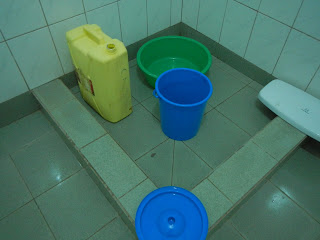2 and a half months on from my trip to Uganda and I have received a letter from Dorothy, who I am now sponsoring with Lauren to board at the school. I have also received the go ahead from Project Director, Dr James Kimera Ssekiwanuka to name his organisation in my blog, so now seems like a great time for a follow up post.
The organisation I was volunteering with was CALM Africa. Anyone interested can read up on them here: http://calmafrica-ug.org/index.htm
The are primarily a child advocacy project, performing assessments where reports have come in of child abuse, neglect and extreme poverty - and then staging interventions where deemed appropriate and necessary. They also run a school called Jolly Mercy. Many of the children there are sponsored by volunteers who have met them on outreach visits, such as I did with Dorothy. More information on the school is available here: http://www.jolly-mercy.net/
In addition to this CALM have a vocational skills school that runs where money allows and the senior members actively lobby the government for child rights legislation changes and educate on child rights as well.
They're very busy people!!
There have been a few cases that people have been asking about, so I've gathered some updates.
Kizimula
Kizimula received his glasses a couple of weeks after I arrived home from Uganda. He will now be able to earn again and feed his wife and grandchildren.
The organisation I was volunteering with was CALM Africa. Anyone interested can read up on them here: http://calmafrica-ug.org/index.htm
The are primarily a child advocacy project, performing assessments where reports have come in of child abuse, neglect and extreme poverty - and then staging interventions where deemed appropriate and necessary. They also run a school called Jolly Mercy. Many of the children there are sponsored by volunteers who have met them on outreach visits, such as I did with Dorothy. More information on the school is available here: http://www.jolly-mercy.net/
In addition to this CALM have a vocational skills school that runs where money allows and the senior members actively lobby the government for child rights legislation changes and educate on child rights as well.
They're very busy people!!
There have been a few cases that people have been asking about, so I've gathered some updates.
Kizimula
Kizimula received his glasses a couple of weeks after I arrived home from Uganda. He will now be able to earn again and feed his wife and grandchildren.
Mariam
Lauren funded an emergency pack for Mariam after I left Uganda. This included mattresses, jerry cans, mosquito nets and other essentials. CALM have also managed to get the police involved and Mariam has been assured that she will be able to stay in the house where she lives with her children.
I believe that there is an ongoing sanitation problem as her latrine was full when we visited, causing serious health concerns every time it rains. Hopefully I'll have the opportunity to check on Mariam when I return and a latrine could be something that donations could help with.
Dorothy
Dorothy has now been boarding at Jolly Mercy for 2 months, sponsored by myself and Lauren. We received a letter from her last week. She seems to be doing so well and is much happier. I am very much looking forward to seeing her in February.
Musa
Unfortunately as my bank is suspicious of me withdrawing cash in Uganda (unreasonable if you ask me), I had to send the money for Musa's treatment from the UK. This was a long frustrating process that took around 2 months. However, the money has now arrived and Musa is being treated in Katalemwa - the disability centre near his slum. I am very eagerly awaiting a full report and confirmation that his wheelchair has been made, but am just so happy that he is finally being treated.
In addition, his mother has been accepted to a women's group made up of Katalemwa mothers who are working together to earn money for medication and food.
What's Next?
I am booked to return to Uganda in February and will be taking my boyfriend, Leckie along with me this time. I have been so overwhelmed with the support than many of you have offered after reading my blogs and will be asking for donations this time around.
My boss has already donated our prize for the award we won and pledged the help of our department for fundraising, but every penny/cent helps.
A little closer to the time I'll be sending out a message asking if anyone would like to contribute, but am happy to take early pledges if anyone is keen to get involved now.
For an idea of what your donation would end up going to:
Kizumula's glasses cost £70
Musa's 1 month treatment, medication, purpose made wheelchair and toilet seat cost around £200
Mariam's emergency pack cost around £70
Dorothy's complete school pack (which includes matress, mosquito net, shoes, etc) and first term of school boarding (which includes lessons, food, counselling etc) cost £180
A latrine costs around £200 to build
I would be able to provide an account of what exactly your money went to, see to it that it was spent in a sustainable way and ensure that none of it was absorbed in administrative costs.
Thank you to everyone who followed my progress whilst in Uganda and who opened up their hearts to the people I met there.



























